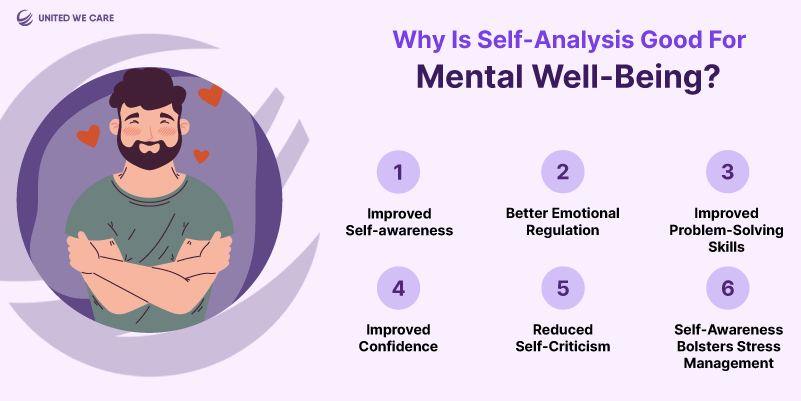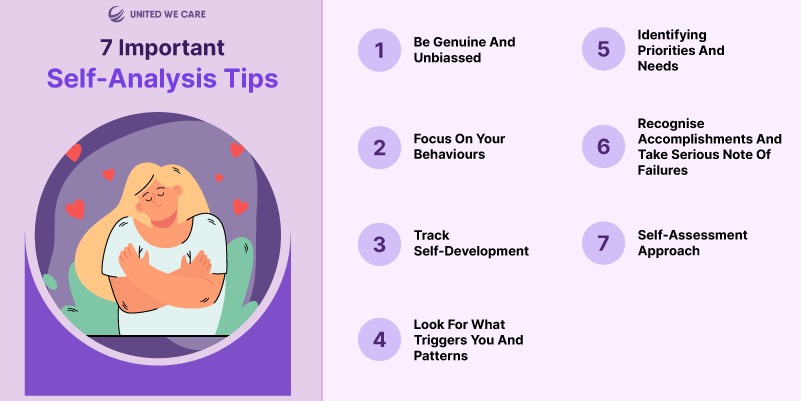Introduction
Self-reflection is one method of investigating one’s thoughts, feelings, and actions in order to attain a better understanding of oneself, thereby promoting personal growth and making good choices. An essential part of the development of humanity and to move forward is to become more thoughtful and think more about what you think and how you behave, which is self-reflection. Understanding who you are is crucial in the present day because you constantly engage with the social environment, and the influences present around you can put you in a tight spot to understand your wants and needs.
What Is Self-Analysis?
Self-analysis is a careful, systematic examination of an individual’s character traits, attitudes, and behaviours. It is the process of looking at ideas, emotions, activities, and experiences. To do this, you must think about yourself and consider many different things in life, such as goals, desires, beliefs, and principles; then, you will acknowledge things that make you feel strong or weak.
The Power of Self-Awareness:
Understanding yourself better than anyone else does.
- You can achieve this by being self-conscious, which helps you observe your emotions, actions, skills, limitations, reasons behind some actions taken so far, and even why certain kinds of habits exist in your life.
- Self-awareness enables you to know why you do what you do, hence giving you an opportunity to manage yourself better.
- Individuals who achieve the ability to be self-aware establish wider relationships with others, thus enhancing interpersonal skills while at work, leading to job satisfaction, which makes life enjoyable as a whole.
Enhanced Decision-Making:
Self-reflection is important because it will help you choose wisely in light of your goals and values. When you know how you think, what motivates you, and what skews your judgment, you will tend to evaluate choices more effectively and predict consequences better, too. Thus, self-reflection reduces impulsivity and improves decision-making, resulting in positive results across various domains in life.
Why Is Self-Analysis Good for Mental Well-Being?

- Improved Self-awareness: For instance, when you engage in self-analysis, you are able to find your communication style, which eventually develops into personal patterns and behaviourisms. You may also know the areas that need improvement; hence, this will make you an effective communicator, leading to good relations at work or home.
- Better Emotional Regulation: During the self-evaluation process, one realizes one’s strengths and weaknesses without any criticism. This knowledge allows for more self-care and personal growth, which may lead to genuine happiness.
- Improved Problem-Solving Skills: Reflect on your prior choices; it’s a way of understanding what is best for you. You will then be able to use this knowledge as guidance when making future choices, thus increasing chances of success in different areas such as career development or relationship building, among others.
- Improved confidence: Once you realize your true potential after analyzing yourself, you tend to become more confident because this realization fuels the understanding of making every task achievable.
- Reduced self-criticism: Being kind to yourself. This practice can help identify many negative words you say and change them to positive ones, which in turn will make you feel good about yourself.
- Self-awareness bolsters stress management: When you look at yourself more profoundly, you can see the things that stress you out so much and be able to take care of them, thus leading a healthy life both physically and mentally.
Moreover, self-analysis creates consciousness, emotional control skills, and problem-solving techniques alongside more effective handling mechanisms for issues, hence promoting wellbeing through having good talks with others as well as growth, among other things.
How Do You Practice Self-Analysis
Your development requires the practice of self-analysis to achieve personal progress. This means you have to recognize your actions continuously and thought processes about yourself. For you to grow, you should learn that it is important for you not only to take into account but also dig deeper into your own behaviours. Thus, this ongoing procedure acts as a tool towards development whereby you get to know yourself and conduct yourself better.
Techniques of Self-Analysis
- Express through writing: Writing about your thoughts, emotions, and observations regularly in a journal can help you comprehend how you feel and how the brain works. You can use prompts or simply write without them to find out more things about yourself. You can use prompts or just write to reveal new aspects of yourself to be included in the future without thinking about it too much.
- Self-Questioning: Asking thought-provoking questions of yourself might be assistive in evaluations. These questions could concern various parts of one’s life, such as goals, values, belief systems, strengths and weaknesses, among other areas that require improvement where they present.
- Professional help: If you’re having long-lasting problems or intense barriers, talk to a therapist who can help you by using methods like counselling to understand your problem in depth and guide you to solve your problem, which may include psychological tests. Learn more about Gestalt Therapy.
- Develop smart objectives for yourself: Routinely assess your progress toward these goals; note any areas for improvement and establish new realistic objectives rooted in this introspection. Divide big targets into little manageable tasks and keep check of your advancement over time.
- Cultivate Self-Compassion: Show love and respect to yourself while you analyze yourself. Acknowledge and accept both your strengths and your weaknesses, and remember that personal growth requires time.
- Techniques in mindfulness should be applied: Being conscious of one’s surroundings could assist a person to be in the present time and combine what they think as well as feel. To meditate with mindfulness, one has to watch their positive thoughts without any evaluations and embrace their feelings.
More Information about- Effective child psychology development
7 Important Self-Analysis Tips
Given below are some additional particular tips for conducting your self-analysis:

- Be Genuine and Unbiassed: When analyzing yourself, try to be genuine and neutral. Without being too critical or too lenient, acknowledge both your strengths and areas where you need to improve.
- Focus on your Behaviours: Rather than just thinking about your thoughts or feelings, pay attention to observable behaviours. For instance, instead of saying, “I am worried,” look at specific activities or reactions that show anxiety, such as avoiding certain situations or having physical symptoms.
- Track self-development: Monitoring your progress with time. This may entail developing a visual aid such as graph or chart showing changes in behavior or achievement of goals. Look back at how far you have come and identify which areas still need attention.
- Look for what triggers you and patterns: The things that make you think, feel or behave in some way should be noted. You should also identify repeat designs/situations which result in good or bad outcomes. You will be able to develop coping mechanisms and break unhelpful cycles with this self-awareness..
- Identifying Priorities and Needs: When identifying the areas for self-assessment, determine which areas are crucial to your objectives and goals at present. Put your efforts and thoughts into those areas for substantial advancement.
- Recognize Accomplishments and Take Serious Note of Failures: All successes and milestones must be appreciated and celebrated as they come. Also, view mistakes and failure as stepping stones towards growth and development. What can you learn from such experiences? Therefore, reflect upon them so that you may make informed decisions in future.
- Self-assessment approach: Change your self-assessment approach if required. What works for others may not work for you, try to find new ways rather than being afraid to try techniques give yourself chances to explor and find which techniques work with you best.
They can help one conduct thorough philosophical scrutiny concerning oneself, leading to both personal and career development.
Read more- Dream Interpretation
Conclusion
To develop self-awareness, self-knowledge and attempt to be the best version of yourself, ensure you carry out any of these training regularly. Evaluate yourself using these techniques by identifying which ones appeal to you most then include them in your plan. Always remember that being honest, curiosity and concern are vital when doing self-analysis.
References
- Lennie, C. (2007). The role of personal development groups in counsellor training: Understanding factors contributing to self-awareness in the personal development group. British Journal of Guidance & Counselling, 35(1), 115-129.
- Brackett, M. A., & Mayer, J. D. (2003). Convergent, discriminant, and incremental validity of competing measures of emotional intelligence. Personality and Social Psychology Bulletin, 29(9), 1147-1158.
- Duval, S., & Wicklund, R. A. (1972). A theory of objective self-awareness.
- Littrell, R. F. (2011). Motivation by Maslow: what Maslow really said. In Change and Control: Perspectives from Business and Labour History. Third annual conference of the Academic Association of Historians in Australian and New Zealand Business Schools (pp. 32-48).
- Van Zant, A. B. (2022). Strategically overconfident (to a fault): How self-promotion motivates advisor confidence. Journal of Applied Psychology, 107(1), 109.
- Littrell, R. F. (2011). Motivation by Maslow: what Maslow really said. In Change and Control: Perspectives from Business and Labour History. Third annual conference of the Academic Association of Historians in Australian and New Zealand Business Schools (pp. 32-48).










